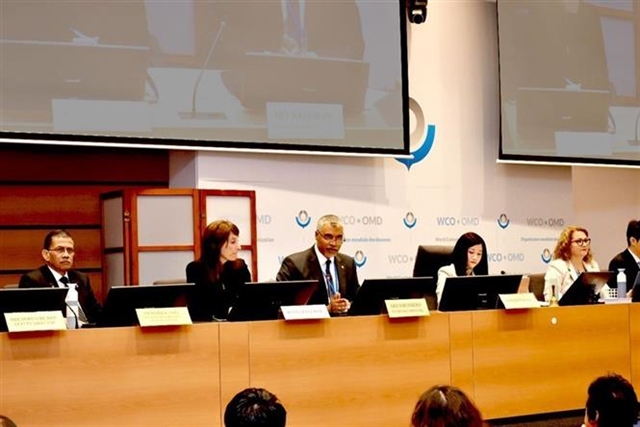 Politics & Law
Politics & Law

 |
| Nguyễn Thị Vĩnh Hoài (second, right) at a session of the Permanent Technical Committee on Brussels, Belgium last October.—VNA/VNS File Photo |
BRUSSELS — Việt Nam has been re-elected as chair of the Permanent Technical Committee (PTC) for the 2025–26 term by members of the World Customs Organization (WCO), following the conclusion of the 247th/248th PTC session held recently in Brussels, Belgium.
Việt Nam’s re-election reinforces its growing stature and influential role in shaping global customs policies and operations.
The decision also reflects international recognition of Việt Nam’s active and effective contributions during its previous tenure.
The appointment will once again be led by Nguyễn Thị Vĩnh Hoài, Counsellor at the Embassy of Việt Nam in Belgium and the country’s representative to the World Customs Organization (WCO).
Her continued leadership underscores the trust and high regard the global customs community places in Việt Nam’s capabilities and commitment to advancing key WCO initiatives.
Reporting from Brussels, Vietnam News Agency (VNA) correspondents noted that the session, held at WCO headquarters, brought together nearly 300 leading customs experts from member administrations, international organisations including the World Trade Organization (WTO) and International Chamber of Commerce (ICC) as well as private sector representatives and global research institutions.
Participants engaged in in-depth discussions aimed at formulating strategies and solutions to help the global customs community address pressing multidimensional challenges.
The challenges include the impacts of climate change, rapid digital transformation, and the exponential growth in international trade volumes, notably the surge in e-commerce.
Over four intensive working days, the session achieved several key outcomes across critical areas.
On e-commerce, a strategic priority for the WCO, the committee conducted focused discussions on topics such as the effective handling of low-value shipments, strengthening collaboration with stakeholders and applying modern digital technologies to improve operational efficiency while ensuring a balance between trade facilitation and regulatory compliance.
In efforts to build and strengthen the global customs network, the committee reviewed the Customs Data Exchange Platform (CDEP), a potential tool to enhance international cooperation, curb revenue losses and improve risk control through real-time automated data exchange.
Regarding rules of origin, the committee adopted the findings of a feasibility study on the Connectivity Framework for Certificates of Origin, a significant step toward digitisation and enhanced customs cooperation.
Updates to WCO guidance on addressing irregular origin claims were also acknowledged.
The smart customs project received strong support, with key achievements including the development and refinement of research on emerging technologies, publication of an in-depth study on implementation challenges and the launch of the smart customs community portal.
On the implementation of the WTO Trade Facilitation Agreement (TFA), updates were made to the WCO’s Mercator Programme to assist governments in effectively enacting trade facilitation measures.
In support of the green customs initiative, the committee discussed and issued new guidelines to advance the green customs action plan, highlighting the pivotal role of customs authorities in addressing environmental challenges.
The committee also endorsed guidance for implementing activities under the action plan for vulnerable borders, aimed at ensuring supply chain security under the most challenging conditions.
In addition, the session reviewed progress on revising the SAFE Framework of Standards, explored the inclusion of micro, small and medium-sized enterprises (MSMEs) in the Authorised Economic Operator (AEO) programme, discussed best practices for free zones, analysed findings from the time release study and considered the development of a Customs Performance Measurement Mechanism (PMM) as well as the expanded use of information and communications technology (ICT) in customs management.
In her closing remarks, Hoài said that in the face of mounting global challenges and emerging opportunities, strengthening international cooperation, fostering innovation and technology adoption, and enhancing adaptability and sustainable development are critical to advancing trade facilitation and ensuring global supply chain security.
Việt Nam’s continued leadership of the committee represents an opportunity for the country to make even more impactful contributions to the development of the global customs community in the years ahead, she said.— VNS




